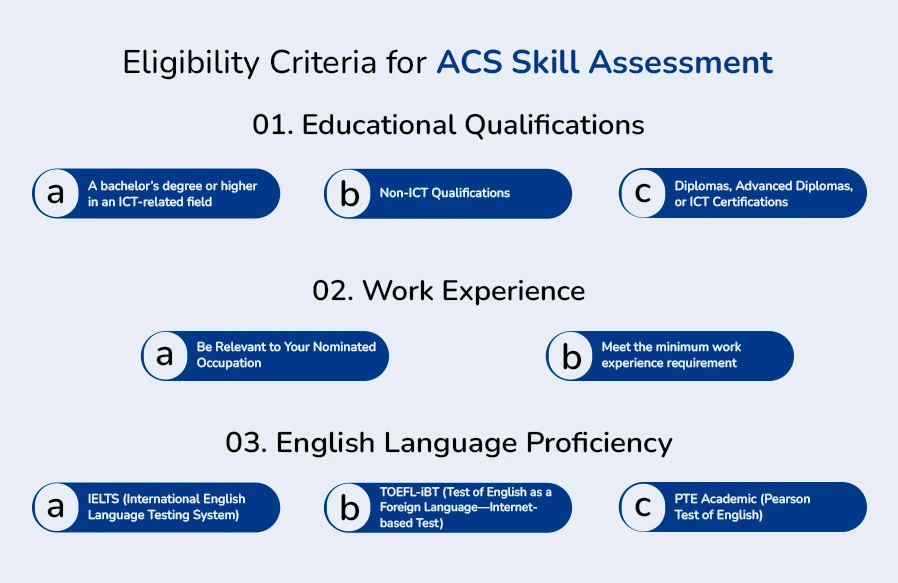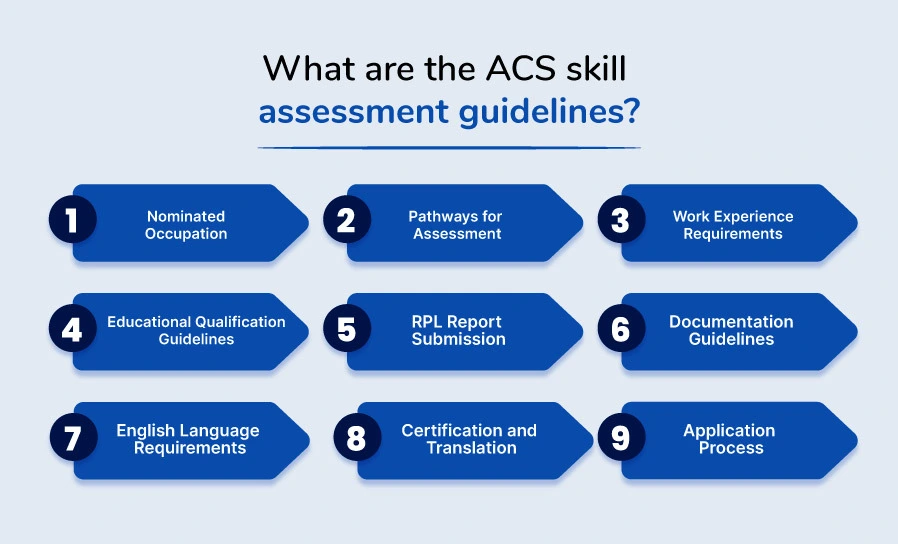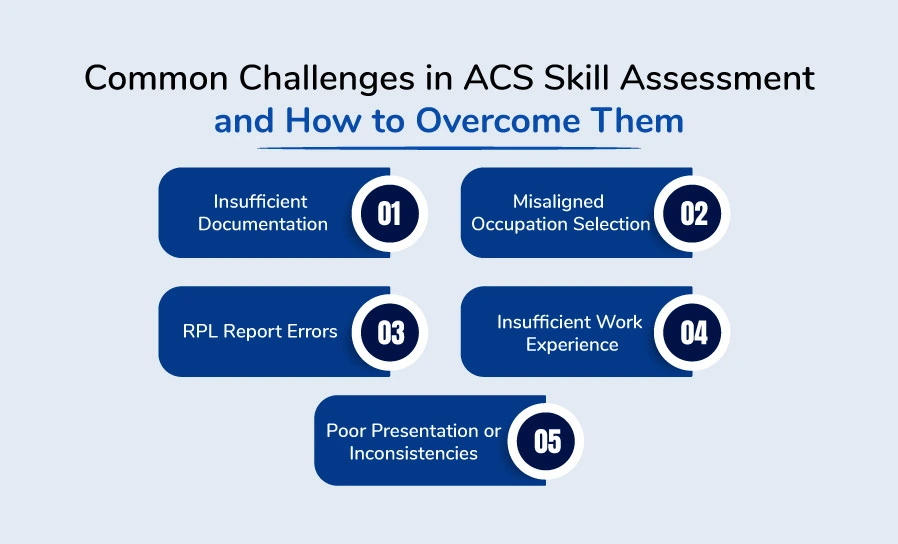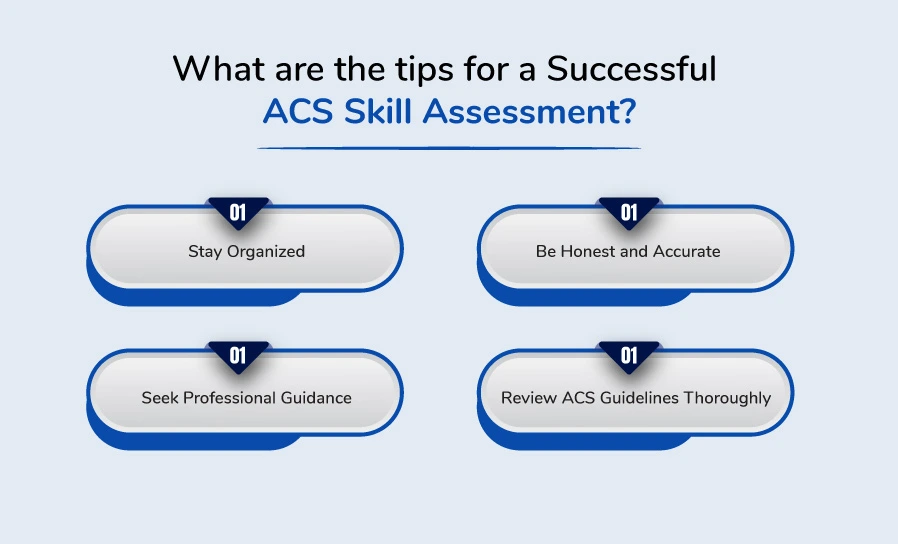
Australia is a dream destination for many professionals seeking to advance their careers and enjoy a high quality of life. For ICT (Information and Communication Technology) professionals, the Australian Computer Society (ACS) Skill Assessment is a critical step in the visa application.
With a positive assessment, you are one step closer to securing a skilled migration visa, enabling you to live and work in Australia. Beyond the formalities, it represents your readiness to contribute to Australia’s dynamic ICT industry and embrace a new chapter of personal and professional growth.
This comprehensive guide will explore everything you need about the ACS Skill Assessment, including its purpose, requirements, application process, and tips for a successful outcome.
What is the ACS Skill Assessment?
The ACS Skill Assessment, conducted by the Australian Computer Society (ACS), is an essential evaluation process for Information and Communication Technology (ICT) professionals aspiring to migrate to Australia under skilled migration pathways.
This assessment is a critical step to ensure that applicants possess the qualifications, skills, and professional experience required to meet Australian standards for ICT occupations listed on the country’s Skilled Occupation List (SOL).
By assessing your education, work history, and technical expertise, the ACS determines whether you meet the eligibility criteria for your chosen ICT-related occupation.
This evaluation is especially valuable as it verifies your ability to perform tasks aligned with your nominated occupation under the ANZSCO (Australian and New Zealand Standard Classification of Occupations) framework.
The ACS Skill Assessment formally recognises your ICT capabilities, aligning them with the expectations of Australian employers and regulatory authorities.
A positive outcome from this assessment is required before submitting an Expression of Interest (EOI) and applying for skilled visas. Without completing this process, ICT professionals cannot advance their skilled migration applications, making it a cornerstone of the migration journey for those seeking to establish their careers in Australia’s thriving ICT sector.
Why is the ACS skill assessment important?
The ACS Skill Assessment is an important part of the skilled migration process for information and communication technology (ICT) professionals who want to work and live in Australia. It certifies that your skills, qualifications, and work experience meet the Australian standards for your chosen ICT occupation.
This evaluation is essential because it demonstrates your ability to contribute to Australia’s workforce effectively, aligning your expertise with the needs of the Australian economy. The assessment ensures that only individuals with the required competence and professional experience are eligible to apply for skilled migration visas.
These visas include the Skilled Independent Visa (Subclass 189), which allows individuals to live and work anywhere in Australia without employer or state sponsorship. The Skilled Nominated Visa (Subclass 190) requires state nomination but provides additional points for eligibility.
The Skilled Work Regional Visa (Subclass 491) encourages skilled professionals to live and work in specific regions of Australia.
Your visa application cannot proceed unless the ACS Skill Assessment results are positive, slowing your migration process. The Australian Government relies on this assessment to ensure that ICT professionals migrating to the country possess the appropriate expertise and can perform tasks that match their nominated occupation under the ANZSCO.
For example, if you nominate yourself as a software engineer, the ACS will evaluate your educational background and work experience. This evaluation will confirm your ability to design, test, and maintain software systems. These duties must align with the requirements defined by the ANZSCO code for the Software Engineer role.
The ACS assessment not only validates your claims but also ensures that the standards for skilled migration remain consistent and beneficial for both migrants and Australia’s economy.
Given its significance, the ACS Skill Assessment acts as the foundation for your skilled migration journey. It connects your professional background to the visa requirements, ensuring that you meet the specific criteria for the skilled migration pathway you are pursuing.
A positive ACS assessment not only strengthens your visa application but also enhances your prospects of settling in Australia as a recognised and qualified ICT professional. Without this validation, your dream of migrating to Australia cannot materialise, underscoring the vital role of the ACS Skill Assessment in the migration process.
Learn more: Why Does ACS Deduct Your Work Experience for Skill Assessment?🤔🤷💭
Eligibility Criteria for ACS Skill Assessment

The ACS Skill Assessment evaluates your eligibility to migrate as an ICT professional by examining specific criteria, including educational qualifications, work experience, and, indirectly, your English language proficiency.
Here’s an explanation of each criterion:
1. Educational Qualifications
Your academic background is a key factor in determining your eligibility for an ACS Skill Assessment. To fulfil the educational prerequisites, you must have:
a. A bachelor’s degree or higher in an ICT-related field
If your degree is directly related to ICT (such as computer science, information systems, or software engineering), it aligns well with the requirements.
With an ICT major, you need less work experience to qualify, as the educational foundation matches the skills expected for ICT occupations.
b. Diplomas, Advanced Diplomas, or ICT Certifications
These qualifications can also be considered; however, they may require more work experience to compensate for the lesser academic coverage of ICT-related subjects.
c. Non-ICT Qualifications
If your degree is unrelated to ICT, you are still eligible. You should provide at least six years of relevant ICT work experience to demonstrate that you have acquired the necessary skills through professional practice.
The ACS assesses whether your education includes sufficient ICT content to meet the minimum requirements for your nominated occupation.
2. Work Experience
Work experience is another critical factor in the ACS Skill Assessment process. Your professional background must:
a. Be Relevant to Your Nominated Occupation
The ACS requires your job roles and responsibilities to align closely with the tasks outlined for your nominated occupation under ANZSCO. For instance, if you nominate yourself as a software engineer, your work experience must demonstrate tasks such as software development, testing, and system maintenance, as defined by the ANZSCO code for that role.
b. Meet the minimum work experience requirement
If you have a major ICT-related degree, you need at least two years of relevant work experience completed within the past ten years.
For an ICT minor degree, the requirement increases to five years of work experience.
Applicants with non-ICT qualifications or without formal education (via the RPL pathway) must show six years of relevant work experience to qualify.
The ACS assesses your work experience to determine its relevance, quality, and duration. Employers’ reference letters must detail your roles, responsibilities, and projects to substantiate your claims.
3. English Language Proficiency
While the ACS does not directly assess your English language skills, proficiency is mandatory for the visa application. You must meet the English requirements set by the Department of Home Affairs for skilled migration visas. Accepted tests include:
a. IELTS (International English Language Testing System)
b. TOEFL-iBT (Test of English as a Foreign Language—Internet-based Test)
c. PTE Academic (Pearson Test of English)
A strong command of English ensures that you can effectively communicate and integrate into Australia’s professional and social environments.
What are the ACS skill assessment guidelines?

The ACS Skill Assessment Guidelines provide a structured framework for ICT professionals applying for a skills assessment with the Australian Computer Society (ACS). These guidelines outline the requirements, criteria, and processes to ensure applicants demonstrate the qualifications and experience necessary for their nominated ICT occupation.
Adhering to these guidelines is essential for achieving a successful outcome. Here’s a comprehensive breakdown:
1. Nominated Occupation
Applicants must choose an ICT-related occupation listed on Australia’s Skilled Occupation List (SOL). The choice of the nominated occupation determines the criteria the ACS uses to assess your qualifications and work experience.
- Your educational background and work experience align with the ANZSCO description for your chosen role.
- The tasks and responsibilities described in your employment references match the required competencies for your nominated occupation.
2. Pathways for Assessment
The ACS Skill Assessment provides multiple pathways depending on your educational qualifications and work experience.
a. ICT Major Qualification Pathway
Your degree is classified as an ICT major, meaning over 65% of your academic coursework is ICT-related.
If your degree is closely related to your nominated occupation, you need two years of relevant work experience within the past ten years.
If your degree is not closely related, you require four years of relevant work experience at any time in your career.
b. ICT Minor Qualification Pathway
Your degree is classified as an ICT minor, with ICT-related content comprising between 33% and 65% of your coursework.
You need five years of relevant work experience at any time in your career, regardless of whether the degree is related or unrelated to your nominated occupation.
c. Non-ICT Qualification Pathway
If your degree is unrelated to ICT or you lack formal qualifications, you can still qualify if you have six years of relevant work experience.
d. Recognition of Prior Learning (RPL) Pathway
This pathway is for individuals without formal ICT qualifications.
- You must submit an RPL report to demonstrate how you acquired ICT skills through work experience and self-learning.
- You need six years of work experience in ICT-related roles if you hold a non-ICT degree or eight years of work experience if you lack formal qualifications altogether.
3. Work Experience Requirements
The ACS evaluates your work experience to determine its relevance and alignment with the ANZSCO code for your nominated occupation. Key points include:
- Relevance
Your roles and responsibilities should directly correspond to the tasks outlined for your nominated occupation.
- Paid Experience
Only paid, full-time work (minimum of 20 hours per week) is considered.
- Duration
A portion of your work experience may be deducted as part of the Skill Level Requirement Met Date, which represents the point when your work experience meets the required standard.
4. Educational Qualification Guidelines
The ACS evaluates your educational background to assess its relevance to your nominated occupation:
- ICT Major vs. ICT Minor
The proportion of ICT-related content in your degree determines whether it is considered a major or minor qualification.
- Australian Qualifications Framework (AQF)
The ACS compares your qualifications to Australian standards under the AQF.
- Level of Qualification
Bachelor’s and higher degrees are more favourable, while diplomas or certifications may require additional work experience to compensate for lower academic coverage.
5. RPL Report Submission
The ACS accepts RPL submissions from applicants who do not hold formal ICT qualifications. The report must include:
- Two detailed project reports
These should showcase your ICT knowledge and skills. Highlight your role, objectives, methodologies, problem-solving techniques, and how your contributions impacted the project.
- Core Knowledge Areas
Explain how you’ve gained expertise in key ICT areas, such as programming, system design, database management, and networking.
6. Documentation Guidelines
Applicants must provide clear, verifiable evidence to support their claims. Key documents include:
- Identity Proof
Passport bio-data page or equivalent.
- Educational Certificates
Degree or diploma certificates and transcripts.
- Employment References
Letters detailing job roles, responsibilities, and durations meet ANZSCO requirements.
- Additional Evidence
Pay slips, tax records, or employment contracts to substantiate your work experience.
7. English Language Requirements
Although the ACS does not assess English proficiency directly, skilled migration visa applications require you to meet the Department of Home Affairs’ English language criteria through tests like IELTS, TOEFL, or PTE Academic.
8. Certification and Translation
- Certification
Certain documents, such as academic transcripts and employer references, may need to be certified by a legal authority.
- Translation
If your documents are in a language other than English, provide certified translations alongside the original copies.
9. Application Process
The application process involves:
a. Creating an Account
Register on the ACS online portal.
b. Submitting the Application
Upload all required documents in PDF format and complete the necessary forms.
c. Paying the Fee
The ACS charges a non-refundable application fee, payable online.
d. Receiving the Outcome
The ACS provides a detailed assessment outcome, including whether your skills meet the standards for your nominated occupation.
Common Challenges in ACS Skill Assessment and How to Overcome Them

The ACS Skill Assessment process is rigorous, and applicants often encounter challenges that can lead to delays or negative outcomes. Below is a detailed explanation of these challenges and strategies to address them effectively:
1. Insufficient Documentation
One of the most common reasons for a negative ACS Skill Assessment outcome is the failure to provide adequate or accurate documentation. The ACS requires specific documents to verify your educational qualifications, work experience, and identity. Missing or poorly prepared documents can weaken your application.
The challenges are as follows:
a. Incomplete Employer References
Missing details about your roles and responsibilities or lacking official signatures and contact details from employers.
b. Unclear Academic Transcripts
Ambiguous course titles or insufficient ICT-related content are highlighted in transcripts.
c. Non-Certified Copies
Submitting uncertified documents when certification is required.
How can we overcome the challenges?
- Prepare Thoroughly
Ensure all documents are complete, legible, and relevant to the application.
- Employer Reference Letters
Provide detailed reference letters specifying job titles, durations, responsibilities, and tools or technologies. Use the templates provided in the ACS guidelines for clarity.
- Certifications and Translations
Get your documents certified by a notary or equivalent authority. For non-English documents, attach certified translations with the original copies.
- Supporting Documents
Submit pay slips, tax records, and employment contracts as additional evidence of your work experience.
2. Misaligned Occupation Selection
Selecting the wrong occupation for your application can lead to a mismatch between your qualifications and the ANZSCO requirements. Each occupation has specific criteria, including tasks and skills, which must align with your work history and education.
The challenges are as follows:
a. Inconsistent Roles and Duties
Your work experience doesn’t align with the ANZSCO description of the nominated occupation.
b. Ambiguous Occupational Titles
Job titles in your experience may not match the nominated occupation (e.g., “IT Consultant” vs. “ICT Business Analyst”).
How can we overcome the challenges?
- Research Thoroughly
Study the ANZSCO descriptions and choose an occupation that closely matches your skills and experience.
- Align Documentation
Ensure your reference letters highlight tasks and responsibilities consistent with the chosen occupation. Avoid generic descriptions and focus on role-specific duties.
- Professional Guidance
If you are unsure about your occupation selection, consult a migration agent or professional advisor experienced with ACS assessments.
3. RPL Report Errors
The RPL pathway is a valuable option for applicants without formal ICT qualifications, but it requires meticulous preparation. Errors in the RPL report, such as vague project descriptions or irrelevant examples, can result in rejection.
The challenges are as follows:
a. Insufficient Detail
Failing to provide comprehensive descriptions of project work and its impact.
b. Lack of Evidence for Core ICT Knowledge
Inadequate demonstration of skills such as programming, system design, or network management.
c. Plagiarism
Submitting copied content from online sources or other reports, which ACS can detect through plagiarism-checking tools.
How can we overcome the challenges?
- Follow ACS Guidelines
Use the ACS-provided RPL template and adhere to its structure. Include detailed explanations of how you gained and applied ICT knowledge through work experience.
- Highlight Real-World Examples
Focus on two major projects where you played a significant role. Provide specific details about the problem, your approach, the tools or technologies used, and the outcomes.
- Original Content
Write unique and authentic reports. Avoid copying from external sources, as ACS strictly evaluates plagiarism.
- Seek Expert Help
Consult with experienced professionals to review and refine your RPL report for clarity and compliance with ACS standards.
4. Insufficient Work Experience
ACS evaluates both the quantity and quality of your work experience. If your experience fails to meet their criteria, your application may be rejected.
The challenges are as follows:
a. Duration Issues
Falling short of the minimum work experience requirement (e.g., two years for ICT majors or six years for non-ICT qualifications).
b. Irrelevant Experience
Work experience that does not align with your nominated occupation or lacks ICT-related tasks.
How can we overcome the challenges?
- Verify Relevance
Ensure that your documented work experience aligns with the tasks outlined in the ANZSCO description for your chosen occupation.
- Gain Additional Experience
If you lack sufficient experience, consider gaining more in the field before applying.
- Provide supporting evidence
Include contracts, pay slips, and tax records to substantiate your claims.
5. Poor Presentation or Inconsistencies
Inconsistent or poorly presented applications can lead to delays or a negative outcome.
The challenges are as follows:
a. Mismatched Details
Differences between your resume, reference letters, and the information provided in your application.
b. Formatting Issues
Poorly formatted documents or files that are not easily readable.
How can we overcome the challenges?
- Ensure Consistency
Cross-check all documents to ensure consistency in dates, job titles, and roles.
- Use Professional Formatting
Present your resume and reports in a clear, professional format that’s easy for ACS assessors to review.
- Double-Check Before Submission
Review your application thoroughly before submission to catch any errors or inconsistencies.
What are the tips for a Successful ACS Skill Assessment?

The ACS Skill Assessment is a critical step for ICT professionals seeking Australian skilled migration. To maximise your chances of success, you must approach the process with precision, honesty, and thorough preparation.
Below is an explanation of the key tips to help you navigate the assessment effectively.
1. Stay Organized
Being organised is essential to managing the complexity of the ACS Skill Assessment. The process requires multiple documents, detailed forms, and strict adherence to ACS requirements.
Why It Matters?
Disorganisation can lead to missed deadlines, incomplete submissions, or rejection due to insufficient documentation.
Steps to Stay Organised
a. Create a checklist.
List all required documents, including identity proofs, degree certificates, academic transcripts, employer references, and supporting evidence like pay slips or tax records.
Tick off items as you collect and prepare them for submission.
b. Organise Files Digitally
Store scanned copies of documents in a dedicated folder on your computer.
Name files systematically (e.g., “DegreeCertificate_JohnDoe.pdf”) to make retrieval easier.
c. Track Deadlines
- Mark important dates, such as the submission deadline and payment of assessment fees.
- Allow enough time for document certification or translation, if needed.
2. Be Honest and Accurate
Integrity is paramount when applying for the ACS Skill Assessment. Providing false information or exaggerating your qualifications or experience can lead to disqualification and may impact future visa applications.
Why It Matters?
ACS cross-checks all submitted information. Any inconsistencies or fabricated details can result in a negative assessment outcome.
How do we maintain honesty?
a. Present Genuine Information
Provide accurate details of your qualifications and work experience. Avoid inflating your responsibilities or fabricating projects to meet ACS requirements.
b. Consistent Documentation
Ensure that all details across your resume, reference letters, and application forms match exactly. Discrepancies, even minor ones, can raise red flags.
c. Explain gaps in employment
If you have gaps in your work history, be open about it. Clearly explain periods of unemployment, study breaks, or career changes in your application.
3. Seek Professional Guidance
If you are unfamiliar with the ACS Skill Assessment process, consulting a professional migration agent or advisor can provide valuable information and ensure your application is error-free.
Why It Matters?
The ACS process involves detailed and technical requirements, which can be confusing for first-time applicants. Professionals with expertise in migration law and ACS procedures can significantly simplify the process.
When to Seek Guidance:
a. Complex Cases
If your qualifications are unrelated to ICT or lack formal education, a migration consultant can guide you through pathways like the RPL.
If your work experience spans multiple roles or industries, they can help align your documentation with ACS standards.
b. First-Time Applicants
Professionals can review your application to ensure it meets all requirements, reducing the risk of rejection.
c. Documentation Issues
If you face challenges obtaining detailed reference letters or other key documents, a consultant can advise alternative strategies or draft documents on your behalf.
4. Review ACS Guidelines Thoroughly
The ACS publishes detailed guidelines for each assessment type, outlining specific requirements and criteria. Familiarising yourself with these guidelines is crucial for a successful application.
Why It Matters?
Failing to follow the ACS guidelines can lead to mistakes such as submitting incorrect documents, misunderstanding assessment pathways, or choosing the wrong nominated occupation.
How to Review the Guidelines Effectively?
a. Understand Your Assessment Pathway
Determine whether your application falls under the ICT Major, ICT Minor, Non-ICT, or RPL category. Each pathway has unique requirements.
b. Analyze ANZSCO Codes
Study the duties and responsibilities listed under the ANZSCO code for your nominated occupation. Ensure that your work experience matches these descriptions.
c. Follow Documentation Instructions
Pay attention to format requirements, such as file types (PDF), certification, and translation guidelines.
d. Double-Check Details
Revisit the guidelines before submitting your application to ensure you have met all criteria.
Conclusion
The ACS Skill Assessment is a key requirement for ICT professionals who aspire to migrate to Australia. It serves as the official validation of your qualifications, work experience, and skills against Australian standards, allowing you to demonstrate your expertise in the competitive Australian labour market.
Whether you’re applying under the ICT Major, ICT Minor, Non-ICT, or RPL pathway, the success of your application relies on thorough preparation, accurate documentation, and adherence to ACS guidelines.
While the assessment process may seem complex, it is an essential step towards achieving your migration goals. By choosing the right occupation, ensuring your documents align with ACS standards, and presenting a clear, well-structured application, you can significantly increase your chances of a positive outcome. Overcoming challenges, such as preparing detailed employment references or creating a strong RPL report, can be made easier with careful attention to detail and, if necessary, professional guidance.
Ultimately, the ACS Skill Assessment opens doors to exciting opportunities in Australia’s vibrant and dynamic ICT sector. With the right preparation and approach, you can confidently navigate this process and take the next step towards building a successful career and life in Australia.
FAQs
1. How much are the ACS fees?
The fees of ACS are given below:
a. Main Application
- ICT Major: AUD 500
- Non-ICT Qualifications: AUD 800
- RPL Pathway: AUD 800
b. Re-assessment: AUD 200
c. Additional Services: Express processing may incur an extra fee.
2. How much time does ACS take for skill assessment?
The ACS Skill Assessment typically takes 8 to 12 weeks to process, though times can vary depending on case complexity or additional information requests.
3. What are the three types of ACS?
The three types of ACS are:
a. ICT Major
b. ICT Minor
c. RPL
4. What is the validity of the ACS skill assessment?
The ACS Skill Assessment is valid for three years after being issued.
5. What are the three conditions of the ACS?
The three conditions of the ACS are listed below:
- Relevant Qualification
- Work Experience Requirements
- Skills and Tasks Alignment

